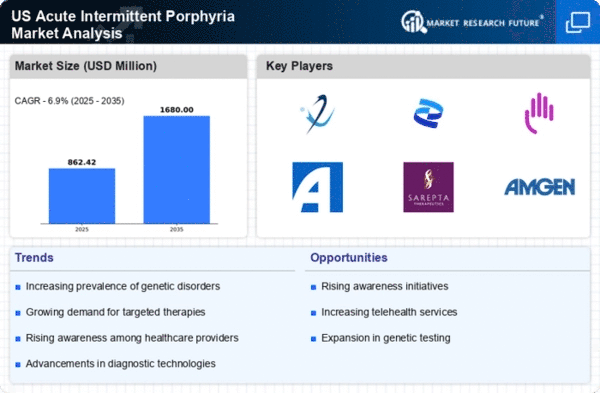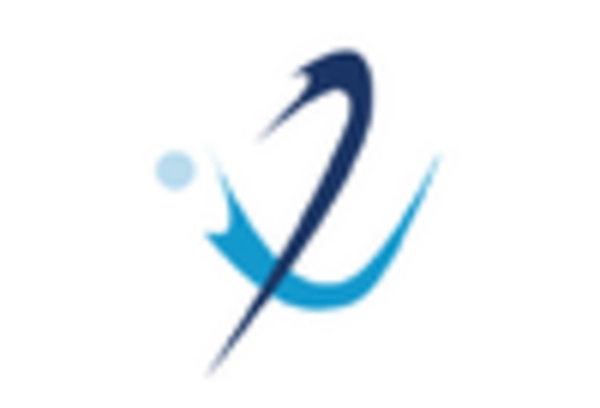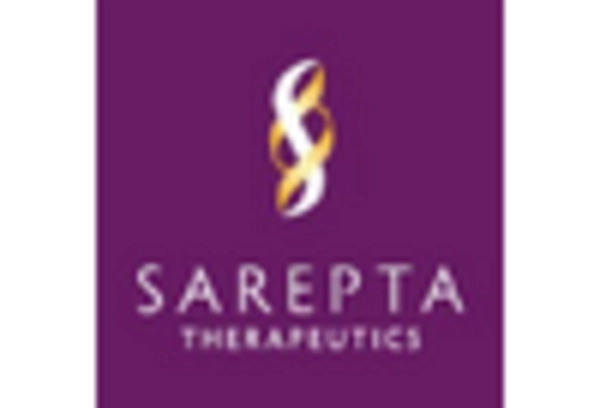Increased Healthcare Expenditure
Healthcare expenditure in the US is on the rise, which positively impacts the acute intermittent-porphyria market. With the increasing allocation of funds towards rare diseases, healthcare systems are more equipped to provide comprehensive care for patients suffering from acute intermittent porphyria. This trend is reflected in the growing number of specialized clinics and treatment centers dedicated to managing rare conditions. As healthcare providers enhance their capabilities, patients are likely to receive better access to diagnostic and therapeutic services, thereby driving market growth. Furthermore, the expansion of insurance coverage for rare disease treatments may also contribute to increased market penetration.
Advancements in Genetic Testing Technologies
The acute intermittent-porphyria market is benefiting from advancements in genetic testing technologies, which facilitate early diagnosis and personalized treatment approaches. The availability of more accurate and cost-effective genetic tests allows for the identification of at-risk individuals, leading to timely interventions. As genetic testing becomes more integrated into routine healthcare practices, the acute intermittent-porphyria market may see an increase in diagnosed cases, thereby expanding the patient population. Moreover, the ability to tailor treatments based on genetic profiles could enhance therapeutic efficacy, further driving market growth.
Growing Patient Advocacy and Support Networks
The acute intermittent-porphyria market is positively impacted by the emergence of patient advocacy and support networks. These organizations play a crucial role in raising awareness about the disorder, providing resources for patients and families, and advocating for research funding. Increased visibility of acute intermittent porphyria through these networks may lead to higher diagnosis rates and improved access to treatment options. Furthermore, as patient communities grow, they can influence healthcare policies and encourage pharmaceutical companies to invest in the development of new therapies, thereby fostering a more robust market environment.
Innovative Research and Development Initiatives
The acute intermittent-porphyria market is significantly influenced by ongoing research and development initiatives aimed at discovering novel therapies. Pharmaceutical companies are investing heavily in clinical trials to explore new treatment modalities, including gene therapy and small molecule drugs. The US government has allocated substantial funding for research in rare diseases, which may bolster the development of targeted therapies for acute intermittent porphyria. As a result, the market could witness the introduction of innovative treatment options that address the underlying causes of the disorder, potentially improving patient quality of life and expanding the market landscape.
Rising Incidence of Acute Intermittent Porphyria
The acute intermittent-porphyria market is experiencing growth due to the rising incidence of this rare genetic disorder. Recent estimates suggest that the prevalence of acute intermittent porphyria in the US is approximately 1 in 20,000 individuals. This increasing number of diagnosed cases is likely to drive demand for effective treatment options and management strategies. As healthcare providers become more aware of the condition, the identification of new patients is expected to rise, further expanding the acute intermittent-porphyria market. Additionally, the growing understanding of the genetic basis of the disorder may lead to improved diagnostic tools, which could enhance patient outcomes and increase market potential.
















